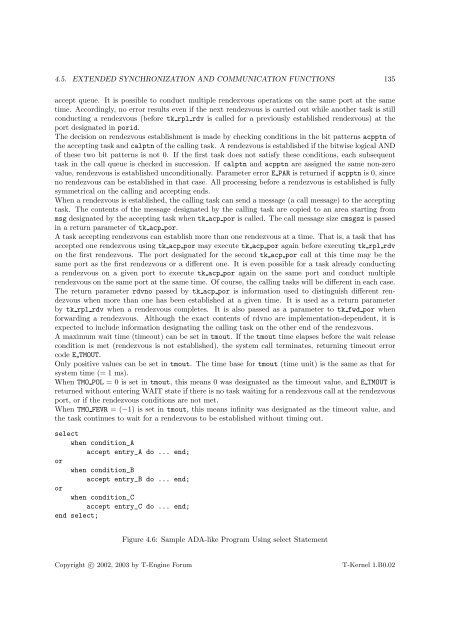T-Kernel Specification (1.B0.02)
T-Kernel Specification (1.B0.02)
T-Kernel Specification (1.B0.02)
Create successful ePaper yourself
Turn your PDF publications into a flip-book with our unique Google optimized e-Paper software.
4.5. EXTENDED SYNCHRONIZATION AND COMMUNICATION FUNCTIONS 135<br />
accept queue. It is possible to conduct multiple rendezvous operations on the same port at the same<br />
time. Accordingly, no error results even if the next rendezvous is carried out while another task is still<br />
conducting a rendezvous (before tk rpl rdv is called for a previously established rendezvous) at the<br />
port designated in porid.<br />
The decision on rendezvous establishment is made by checking conditions in the bit patterns acpptn of<br />
the accepting task and calptn of the calling task. A rendezvous is established if the bitwise logical AND<br />
of these two bit patterns is not 0. If the first task does not satisfy these conditions, each subsequent<br />
task in the call queue is checked in succession. If calptn and acpptn are assigned the same non-zero<br />
value, rendezvous is established unconditionally. Parameter error E PAR is returned if acpptn is 0, since<br />
no rendezvous can be established in that case. All processing before a rendezvous is established is fully<br />
symmetrical on the calling and accepting ends.<br />
When a rendezvous is established, the calling task can send a message (a call message) to the accepting<br />
task. The contents of the message designated by the calling task are copied to an area starting from<br />
msg designated by the accepting task when tk acp por is called. The call message size cmsgsz is passed<br />
in a return parameter of tk acp por.<br />
A task accepting rendezvous can establish more than one rendezvous at a time. That is, a task that has<br />
accepted one rendezvous using tk acp por may execute tk acp por again before executing tk rpl rdv<br />
on the first rendezvous. The port designated for the second tk acp por call at this time may be the<br />
same port as the first rendezvous or a different one. It is even possible for a task already conducting<br />
a rendezvous on a given port to execute tk acp por again on the same port and conduct multiple<br />
rendezvous on the same port at the same time. Of course, the calling tasks will be different in each case.<br />
The return parameter rdvno passed by tk acp por is information used to distinguish different rendezvous<br />
when more than one has been established at a given time. It is used as a return parameter<br />
by tk rpl rdv when a rendezvous completes. It is also passed as a parameter to tk fwd por when<br />
forwarding a rendezvous. Although the exact contents of rdvno are implementation-dependent, it is<br />
expected to include information designating the calling task on the other end of the rendezvous.<br />
A maximum wait time (timeout) can be set in tmout. If the tmout time elapses before the wait release<br />
condition is met (rendezvous is not established), the system call terminates, returning timeout error<br />
code E TMOUT.<br />
Only positive values can be set in tmout. The time base for tmout (time unit) is the same as that for<br />
system time (= 1 ms).<br />
When TMO POL = 0 is set in tmout, this means 0 was designated as the timeout value, and E TMOUT is<br />
returned without entering WAIT state if there is no task waiting for a rendezvous call at the rendezvous<br />
port, or if the rendezvous conditions are not met.<br />
When TMO FEVR = (−1) is set in tmout, this means infinity was designated as the timeout value, and<br />
the task continues to wait for a rendezvous to be established without timing out.<br />
select<br />
when condition_A<br />
accept entry_A do ... end;<br />
or<br />
when condition_B<br />
accept entry_B do ... end;<br />
or<br />
when condition_C<br />
accept entry_C do ... end;<br />
end select;<br />
Figure 4.6: Sample ADA-like Program Using select Statement<br />
Copyright c○ 2002, 2003 by T-Engine Forum<br />
T-<strong>Kernel</strong> <strong>1.B0.02</strong>












![[8] 2002 e-business-strategies-for-virtual-organizations](https://img.yumpu.com/8167654/1/190x257/8-2002-e-business-strategies-for-virtual-organizations.jpg?quality=85)


